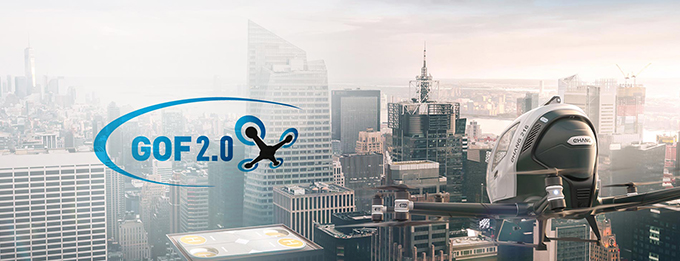Goal to Integrate Unmanned Aerial System Traffic Management into Air Traffic Management
Guangzhou, China, February 8, 2021 -- EHang Holdings Limited (Nasdaq: EH) (“EHang” or the “Company”), the world's leading autonomous aerial vehicle (AAV) technology platform company, today announced its participation in the European Union "GOF 2.0 Integrated Urban Airspace Validation" project, which is a follow-up to the SESAR JU GOF U-space project. GOF 2.0 is focused on developing the safe, secure, and sustainable integration of unmanned aerial vehicle (UAV) operations in urban airspace. As one of the 13 consortium members and the leading passenger electric vertical takeoff and landing (eVTOL) company, EHang is expected to ensure safe flight operations in all degrees of airspace in order to provide fair and efficient access to shared airspace.

SESAR JU GOF 2.0 was initiated in January 2021 to demonstrate the compatibility of existing Air Traffic Management (ATM) and U-space systems and services. The project intends to show safe integration of Unmanned Aerial Systems (UAS), eVTOLs, and manned operations in a unified, dense urban airspace. A planned series of demonstrations in next two years will include highly automated real time separation and networks for air-ground communication.
As a global pioneer of urban air mobility (UAM), EHang is dedicated to creating a safe, secure, and sustainable integration of UAS Traffic Management (UTM) into ATM systems. EHang aims to establish a comprehensive UAM ecosystem including infrastructure, software and supporting service systems, which matches the mission of the GOF 2.0 project to enable cost-effective operations of autonomous and semi-autonomous UAVs Beyond Visual Line of Sight (BVLOS) in shared airspace. EHang believes its EH216 passenger-grade AAVs will be gradually accepted for autonomous air taxi services by Air Navigation Service Providers (ANSPs), airspace users, regulatory authorities, and ultimately the flying public.
About EHang
EHang (Nasdaq: EH) is the world's leading autonomous aerial vehicle (AAV) technology platform company. Our mission is to make safe, autonomous, and eco-friendly air mobility accessible to everyone. EHang provides customers in various industries with AAV products and commercial solutions: air mobility (including passenger transportation and logistics), smart city management, and aerial media solutions. As the forerunner of cutting-edge AAV technologies and commercial solutions in the global Urban Air Mobility (UAM) industry, EHang continues to explore the boundaries of the sky to make flying technologies benefit our life in smart cities. For more information, please visit www.ehang.com.
About GOF 2.0
The GOF 2.0 Integrated Urban Airspace VLD (GOF 2.0) very large demonstration project will safely, securely, and sustainably demonstrate operational validity of serving combined UAS, eVTOL and manned operations in a unified, dense urban airspace using current ATM and U-space services and systems. Both ATM and U-space communities depend extensively on the provision of timely, relevant, accurate and quality-assured digital information to collaborate and make informed decisions. The demonstrations focus on validation of the GOF 2.0 architecture for highly automated real-time separation assurance in dense air space including precision weather and telecom networks for air-ground communication and will significantly contribute to understanding how the safe integration of UAM and other commercial drone operations into ATM Airspace without degrading safety, security or disrupting current airspace operations can be implemented. The GOF 2.0 project is one of several projects managed by the SESAR Joint Undertaking that are dedicated to U-space, the European Commission’s initiative for the safe and secure integration of drones into the airspace. This project has received funding from the SESAR Joint Undertaking under the European Union's Horizon 2020 research and innovation programme under grant agreement No 101017689.

Safe Harbor Statement
This press release contains statements that may constitute “forward-looking” statements pursuant to the “safe harbor” provisions of the U.S. Private Securities Litigation Reform Act of 1995. These forward-looking statements can be identified by terminology such as “will,” “expects,” “anticipates,” “aims,” “future,” “intends,” “plans,” “believes,” “estimates,” “likely to” and similar statements. Management has based these forward-looking statements on its current expectations, assumptions, estimates and projections. While they believe these expectations, assumptions, estimates and projections are reasonable, such forward-looking statements are only predictions and involve known and unknown risks and uncertainties, many of which are beyond management's control. These statements involve risks and uncertainties that may cause EHang's actual results, performance or achievements to differ materially from any future results, performance or achievements expressed or implied by these forward-looking statements.